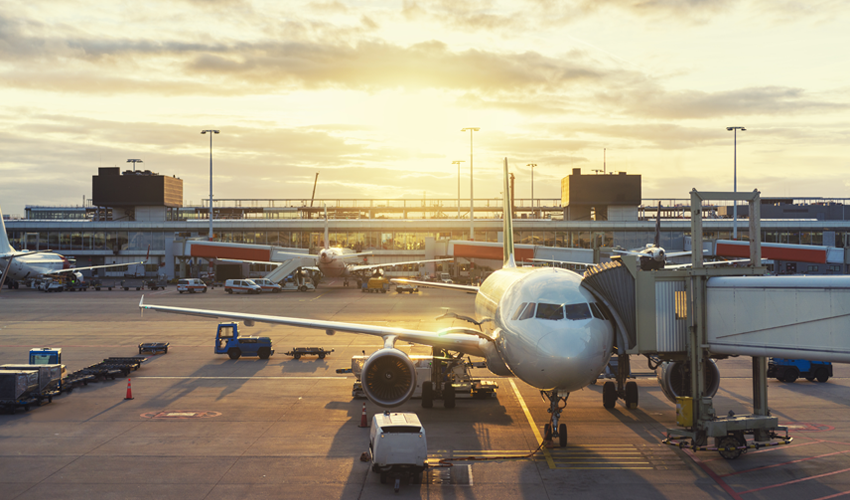Expect 2024 to be the year when airport technology undergoes a major overhaul. Experts predict a surge of emerging technologies to revolutionize airport operations. Additionally, IATA’s new report addresses the environmental impact of single-use plastics, aligning with airlines’ sustainability efforts. The latest AviationPros podcast provides expert insights on taking a proactive approach to sustainability and creating a green optimization initiative, featuring INFORM’s SVP Uschi Schulte-Sasse. Lastly, OAG reveals the ‘Top 10 Busiest Global Airports in the World’. Find out more in this article.
Unlocking Efficiency at Airports with Emerging Tech
Airports are under immense pressure to meet passengers’ expectations as evident from the record-breaking 4.7 billion passengers estimated globally. According to IATA, passengers’ top priority for travel is convenience. This comes after last summer’s travel season, which was marred by long security queues, flight delays or cancellations, and poor baggage management. Furthermore, soaring consumer demand amid labor shortages and escalating costs make traveler expectations more difficult to meet than ever before.
Due to airports being incredibly decentralized, there is a lack of cohesion. This creates breakdowns in communication, leading to inefficient logistics and accumulating lag times that cause a domino effect across entire airport ecosystems. To tackle these hurdles, airports are turning to advanced technologies. 3D perception when paired with IoT networks, seem to help consolidate operation silos and make airports increasingly connected, enabling greater automation across all operations.
Artificial Intelligence (AI) is also revolutionizing airport management, powering digital twins to gather insightful data. With 3D data from terminals, passenger traffic flow can be recorded and examined to better track, understand, and predict behavior. This can become a valuable resource that can be shared and leveraged between departments to enhance planning, staffing, and ultimately the traveler’s journey.
IATA´s Mitigation Strategies for Single-Use Plastics Products
In late 2023, The IATA passenger insights survey showed that more than three quarters of passengers would feel better about flying if it did not involve any single-use plastics products (SUPP). Moreover, they mentioned would be happy to support fewer food and beverage options so that airlines could make this happen. Approx. 50% of cargo customers include waste reduction along the supply chain among their top priorities according to a 2022 IATA Shipper Survey. In fact, cargo operators are receiving requests from end customers to reduce the associated plastic packaging and wrapping.
Some Key IATA Recommendations:
- Reduce waste and reuse –and professionally assess the need for SUPP. Set clear targets for elimination, measurement, tracking and compile results.
- Introduce reusable items and drive circularity. Implement a closed-loop service on aircraft, factoring in potential added weight of reusables on fuel burn and carbon emissions.
- Improve waste management and recovery by facilitating onboard and ground waste segregation. Conduct waste composition audits for passenger and cargo operations.
These recommendations and others within their report will help airlines, regulators, and the supply chain to manage the complexities of reducing SUPP. This includes finding alternatives to SUPP, creating a harmonized regulatory framework, and promoting sector-wide collaboration.


Podcast: Sustainability in Ground Handling Operations
During the latest AviationPros podcast session, INFORM’s SVP Uschi Schulte-Sasse shares some sustainability achievements with Ground Support Worldwide editor Josh Smith. The conversation delves deeper into how ground handlers are contributing to aviation sustainability. Furthermore, Schulte-Sasse covers everything from electric ground support equipment (GSE) to aircraft turnaround. In addition, they discuss streamlining processes like baggage handling and cargo loading to reduce the time an aircraft spends on the ground with engines running, and even delve into sustainable waste practices.
Here Are a Few of the Takeaways from The Podcast:
- Unveiled are new decision-making strategies in digitalization that show how ground handling companies can optimize operations while reducing their environmental footprint.
- Uncover key factors to taking a proactive approach to sustainability and how to create a green optimization initiative that enhances optimization criteria towards sustainability. From INFORM’s standpoint, this means a lot more than just looking at reducing emissions, it is a deeper dive into how to actively contribute to reaching many of the 17 sustainable development goals that the UN published in 2009-2015.
- Discover ways to create balance. For example, don’t only look to reduce CO2 emissions in GSE but also be sure to consider a fair distribution of working healthy shift rotations.
Busiest Airports in the World Unveiled
OAG surveyed total airline capacity worldwide (both domestic and international flights) to unveil the busiest airports in the world. Here are the rankings:
- Atlanta Hartsfield-Jackson International Airport (ATL) remains the busiest airport globally in April 2024 with 5.2 million seats, 3% more seats per day than last month.
- Dubai International Airport (DXB) is in second place with 4.9 million seats.
- Tokyo International Airport (HND) remains in third place with 4.5 million seats.
- Istanbul Airport (IST) will see the biggest increase in seats per day this month compared to last month as the IATA summer season begins, with an increase of 10% capacity, which moves the airport from eleventh place up to sixth.
- Chicago O’Hare International Airport (ORD) has also had a large increase in seats per day with the season change, adding 7%, which moves the airport from the twelfth busiest global airport to the ninth.
- Beijing Capital International Airport (PEK) and Delhi Airport (DEL) have both dropped out of the top 10 this month.
- There is only one new airport since last year in the top 10. Shanghai Pudong International Airport (PVG), which is in tenth place and was in 29th place in April 2023.
>> How do you think emerging technologies will continue to reshape airport operations in the coming years, and what impact do you foresee this having on sustainability efforts within the aviation industry? Share your thoughts in the comments.





0 comments on “Aviation Wrap-up April 2024: Sustainability in Focus”